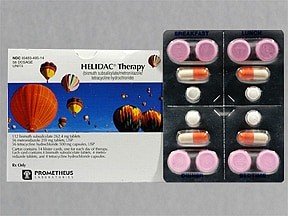
Contents
- 1 Helidac (bismuth subsalicylate/metronidazole/tetracycline hydrochloride)
- 1.0.1 What are the side effects of Helidac?
- 1.0.2 What is the dosage for Helidac?
- 1.0.3 What drugs interact with Helidac?
- 1.0.3.1 Methoxyflurane
- 1.0.3.2 Disulfiram
- 1.0.3.3 Alcohol
- 1.0.3.4 Oral Contraceptives
- 1.0.3.5 Anticoagulants
- 1.0.3.6 Lithium
- 1.0.3.7 Antacids, Multivitamins, Or Dairy Products
- 1.0.3.8 Antidiabetic Agents, Aspirin, Probenecid, Or Sulfinpyrazone
- 1.0.3.9 Busulfan
- 1.0.3.10 Inhibitors Of CYP450 Liver Enzymes
- 1.0.3.11 Inducers Of CYP450 Liver Enzymes
- 1.0.3.12 Drugs That Prolong The QT interval
- 1.0.3.13 Is Helidac safe to use while pregnant or breastfeeding?
- 1.0.4 Summary
Helidac (bismuth subsalicylate/metronidazole/tetracycline hydrochloride)
Helidac Therapy is a combination of antibiotics used to treat Helicobacter pylori, a bacterial infection involved in causing stomach ulcers.
What are the side effects of Helidac?
Metronidazole has been shown to be carcinogenic in mice and rats. Unnecessary use of the drug should be avoided. Its use should be reserved for the conditions described in the prescription labeling.
Common side effects of Helidac Therapy include:
- nausea
- vomiting
- indigestion
- diarrhea
- stomach or abdominal pain
- constipation
- loss of appetite
- headache
- mouth pain
- metallic taste in mouth
- trouble swallowing
- dizziness
- cold symptoms (stuffy nose, sneezing, sore throat)
- vaginal itching or discharge
- swollen tongue
- black or "hairy" tongue
Tell your doctor if you have unlikely but serious side effects of Helidac Therapy including:
- ringing in the ears
- joint pain
- numbness or tingling of arms or legs
- frequent or painful urination
- discolored teeth
- mental/mood changes (e.g., nervousness, irritability, depression)
To reduce the development of drug-resistant bacteria and maintain the effectiveness of Helidac Therapy and other antibacterial drugs, Helidac Therapy should be used only to treat or prevent infections that are proven or strongly suspected to be caused by bacteria.
THESE PRODUCTS ARE INTENDED ONLY FOR USE AS DESCRIBED.
The individual products contained in this package should not be used alone or in combination for other purposes. The information described in this labeling concerns only the use of these products as indicated in this combination package.
For information on use of the individual components when dispensed as individual medications outside this combined use for treating Helicobacter pylori, please see the package inserts for each individual product.
What is the dosage for Helidac?
Adults
- The recommended dosages are: bismuth subsalicylate, 525 mg (two 262.4 mg-chewable tablets), metronidazole, 250 mg (one 250-mg tablet), and tetracycline hydrochloride, 500 mg (one 500-mg capsule) taken four times daily for 14 days plus an H2 antagonist approved for the treatment of acute duodenal ulcer.
- Patients should be instructed to take the medicines at mealtimes and at bedtime.
- The bismuth subsalicylate tablets should be chewed and swallowed.
- The metronidazole tablet and tetracycline hydrochloride capsule should be swallowed whole with a full glass of water (8 ounces). Concomitantly prescribed H2 antagonist therapy should be taken as directed.
- Ingestion of adequate amounts of fluid, particularly with the bedtime dose of tetracycline hydrochloride, is recommended to reduce the risk of esophageal irritation and ulceration.
- Missed doses can be made up by continuing the normal dosing schedule until the medication is gone.
- Patients should not take double doses.
- If more than 4 doses are missed, the prescriber should be contacted.
What drugs interact with Helidac?
Methoxyflurane
- Do not administer methoxyflurane to patients taking Helidac Therapy.
- The concurrent use of tetracycline hydrochloride, a component of Helidac Therapy, with methoxyflurane has been reported to result in fatal renal toxicity.
Disulfiram
- Psychotic reactions have been reported in alcoholic patients who are using metronidazole and disulfiram concurrently.
- Helidac Therapy should not be given to patients who have taken disulfiram within the last 2 weeks.
Alcohol
- Consumption of alcoholic beverages or administration of other products containing propylene glycol during treatment with Helidac Therapy and for at least 3 days afterwards may cause a disulfiram-like reaction (abdominal cramps, nausea, vomiting, headaches, and flushing) due to the interaction between alcohol or propylene glycol and metronidazole, a component of Helidac Therapy.
- Discontinue alcoholic beverage or other products containing propylene glycol during and for at least 3 days after therapy with Helidac Therapy.
Oral Contraceptives
- Concurrent use of Helidac Therapy with oral contraceptive may make oral contraceptives less effective due to an interaction with the tetracycline component of Helidac Therapy.
- Breakthrough bleeding has been reported. Women of child-bearing potential should use a different or additional form of contraception while taking Helidac Therapy.
Anticoagulants
- Helidac Therapy may alter the anticoagulant effects of warfarin and other oral coumarin anticoagulants.
- Salicylates may cause an increased risk of bleeding when administered with anticoagulant therapy.
- Metronidazole has been reported to potentiate the anticoagulant effect of warfarin, and other oral coumarin anticoagulants, resulting in a prolongation of prothrombin time.
- Tetracycline has been shown to depress plasma prothrombin activity. Prothrombin time, International Normalized Ratio (INR), or other suitable anticoagulation tests should be closely monitored if Helidac Therapy is administered concomitantly with warfarin.
- Patients should also be monitored for evidence of bleeding.
Lithium
- In patients stabilized on relatively high doses of lithium, short-term use of Helidac Therapy may cause elevation of serum lithium concentrations and signs of lithium toxicity due to the interaction between metronidazole and lithium.
- Serum lithium and serum creatinine concentrations should be monitored several days after beginning treatment with Helidac Therapy to detect any increase that may precede clinical symptoms of lithium toxicity.
Antacids, Multivitamins, Or Dairy Products
- The absorption of Helidac Therapy may be reduced if administered with antacids containing aluminium, calcium, or magnesium; preparations containing iron, zinc, or sodium bicarbonate; or milk or dairy products due to the interaction between these products and tetracycline.
- These products should not be consumed concomitantly with Helidac Therapy.
- However, the clinical significance of reduced tetracycline systemic exposure is unknown as the relative contribution of systemic versus local antimicrobial activity against Helicobacter pylori has not been established.
Antidiabetic Agents, Aspirin, Probenecid, Or Sulfinpyrazone
- Caution is advised in the administration of bismuth subsalicylate to patients taking medication for diabetes (possible enhanced hypoglycemic effect when given with salicylates) or patients taking aspirin (may increase the risk of salicylate toxicity), probenecid, or sulfinpyrazone (uricosuric effects of probenecid or sulfinpyrazone may be decreased).
Busulfan
- Metronidazole has been reported to increase plasma concentrations of busulfan, which can result in an increased risk for serious busulfan toxicity. Helidac Therapy should not be administered concomitantly with busulfan unless the benefit outweighs the risk.
- If no therapeutic alternatives to Helidac Therapy are available, and concomitant administration with busulfan is medically needed, frequent monitoring of busulfan plasma concentration should be performed and the busulfan dose should be adjusted accordingly.
Inhibitors Of CYP450 Liver Enzymes
- The simultaneous administration of Helidac Therapy and drugs that inhibit microsomal liver enzymes, such as cimetidine, may result in a prolonged half-life and decreased plasma clearance of metronidazole.
Inducers Of CYP450 Liver Enzymes
- The simultaneous administration of Helidac Therapy and drugs that induce microsomal liver enzymes, such as phenytoin or phenobarbital, may accelerate the elimination of metronidazole, resulting in reduced plasma concentrations of metronidazole.
- Impaired clearance of phenytoin has also been reported in this situation.
- Monitor phenytoin concentrations during treatment with Helidac Therapy.
Drugs That Prolong The QT interval
- QT prolongation has been reported, particularly when metronidazole was administered with drugs with the potential for prolonging the QT interval.
Is Helidac safe to use while pregnant or breastfeeding?
- Helidac Therapy contains bismuth subsalicylate, metronidazole, and tetracycline hydrochloride.
- There are no adequate and well-controlled studies of Helidac Therapy in pregnant women.
- However, tetracycline can cause fetal harm when administered to a pregnant woman.
- The use of tetracycline during the second and third trimester of pregnancy can also cause permanent discoloration of the teeth (yellow-gray brown) and possibly inhibit bone development.
- Administration of oral tetracycline to pregnant rats at various doses resulted in yellow fluorescence in teeth and bones in the newborn animals.
- If this drug is used during pregnancy, or if the patient becomes pregnant while taking this drug, the patient should be apprised of the potential hazard to the fetus.
- Metronidazole is present in human milk at concentrations similar to maternal serum levels, and infant serum levels can be close to or comparable to infant therapeutic levels.
- Because of the potential for tumorigenicity shown for metronidazole in animal studies, a decision should be made whether to discontinue nursing or to discontinue metronidazole, taking into account the importance of the therapy to the mother.
- Alternatively, a nursing mother may choose to pump and discard human milk for the duration of Helidac Therapy, and for 24 hours after therapy ends and feed her infant stored human milk or formula.
Summary
Helidac Therapy is a combination of antibiotics used to treat Helicobacter pylori, a bacterial infection involved in causing stomach ulcers. Common side effects of Helidac Therapy include nausea, vomiting, indigestion, diarrhea, stomach or abdominal pain, constipation, loss of appetite, headache, mouth pain, metallic taste in mouth, trouble swallowing, dizziness, cold symptoms (stuffy nose, sneezing, sore throat), vaginal itching or discharge, swollen tongue, or black or "hairy" tongue.


